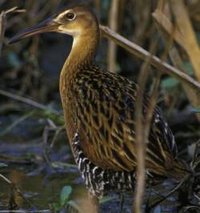King Rail
|
|
| King Rail | ||||||||||||||
|---|---|---|---|---|---|---|---|---|---|---|---|---|---|---|
 | ||||||||||||||
| Scientific classification | ||||||||||||||
| ||||||||||||||
| Binomial name | ||||||||||||||
| Rallus elegans Audubon, 1834 |
The King Rail, Rallus elegans, is a waterbird, the largest North American rail.
Distinct features are a long bill with a slight downward curve, with adults being brown on the back and rusty-brown on the face and breast with a dark brown cap. They also have a white throat and a light belly with barred flanks. Immature birds are light brown on the head and darker brown on the back and wings.
They breed in marshes in eastern North America. The nest is a raised platform built with marsh vegetation and covered by a canopy. The King Rail interbreeds with the Clapper Rail where their ranges overlap; some researchers believe that these two birds belong to the same species.
Birds along the southeastern coasts of the United States are permanent residents. Other birds migrate to the southern United States and Mexico.
These birds forage in shallow water near cover and mainly eat aquatic insects and crustaceans.
These birds are still common in some coastal areas, although interior populations have declined due to habitat loss.
This bird's most common call is a low grunt.
